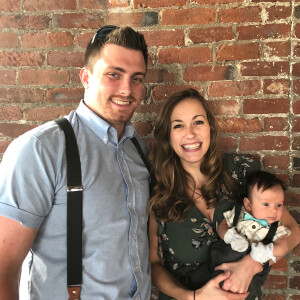God shows his love
December 23, 2018 | Elia Mrakovich
 Editor's Note
Editor's Note
About the author: Elia Mrakovich started as ZPC's director of next generation ministries this spring. He and his wife Erin have one son, Rowan.
About this post: This blog post is part of a series of daily devotionals where we are exploring traditional Advent themes of hope, joy, peace, and love. To sign up to receive text notification of these posts, text zpc advent to 39970. Advent booklets are also available at the ZPC Welcome Center. We welcome your comments and questions each day.
TODAY'S SCRIPTURE: Zephaniah 3:14-20
Main Idea: God shows his love by maintaining the best parts of who we are and nurturing the rest of us into life giving beings.
Take a moment to read Zephaniah 3:14-20 and write down one or two ideas that seem to be repeated within the reading.
I was greatly encouraged reading today’s scripture, to the point of joy. It is clear to see that redemption, protection, and love are key to what God is communicating through Zephaniah. If you have time I encourage you to read all of Zephaniah (It’s a short book!). This prophecy, this poem, this message is written during the reign of one of the few very good kings of Israel; his name is Josiah.
Josiah, the boy king, was given the throne at the age of 8. While he was 16, he began to pursue God. Josiah wondered who God was and where he had gone. During the previous 85 or so years the Israelites had been serving idols–often worshiping Baal or the Asherah poles. Two different kings had encouraged this lifestyle. Josiah, however, eventually destroyed all the idols, and renewed the nation’s covenant with God.
Painfully this was ineffective, Josiah would go on to die in a battle caused only by his pride, and the nation would descend once again into turmoil until Babylon came and exiled the people of Israel.
What a great devotional on love, right?! While it may not seem that way at first, Zephaniah balances two major ideas: justice and love. The justice of God’s wrath brought to the enemies of Israel and the cultural leaders of Israel at the time is aggressive and without mercy. The love of God seen in the latter portion of the book is offered to “the remnant of Israel” or those that despite the culture did not turn from God, but continued to live with integrity and grace. This remnant will not be condemned because of the nation’s failure, and will not be saved because of the kings’ reforms. They will be save through the ferocious love that God has for the people that yearn to be free of the oppressors in this world.
Zephaniah goes onto to describe the Messiah, the one who comes to live among us, to be apart of life with us, our sufferings, our joys, the savior who would sing songs with us and recite poetry alongside us. The God, the Divine, Emmanuel, who would not condemn his people but instead purify them, and participate with them. God does not save the whole of us, he prunes the dead parts and nourishes the living, he accentuates the life giving parts of us and replicates those characteristics into every area of our lives.
Activity:
Take 5 minutes to write down a few things about yourself that adds life to you or those around you. Next, spend a few minutes thanking God that he takes complete joy in (potentially) our only life giving trait and seeks to nurture that remnant into the whole of our being.
Prayer:
Father,
We know that you are a just king, one who seeks to make right the whole of creation. We praise you that you are not willing to give up on us, but instead love us and strive to make us right with you. Thank you for your Son Jesus, our mighty Savior. We ask that we would continue to raise up a generation who would honor you, and seek your purifying fire.
Amen.